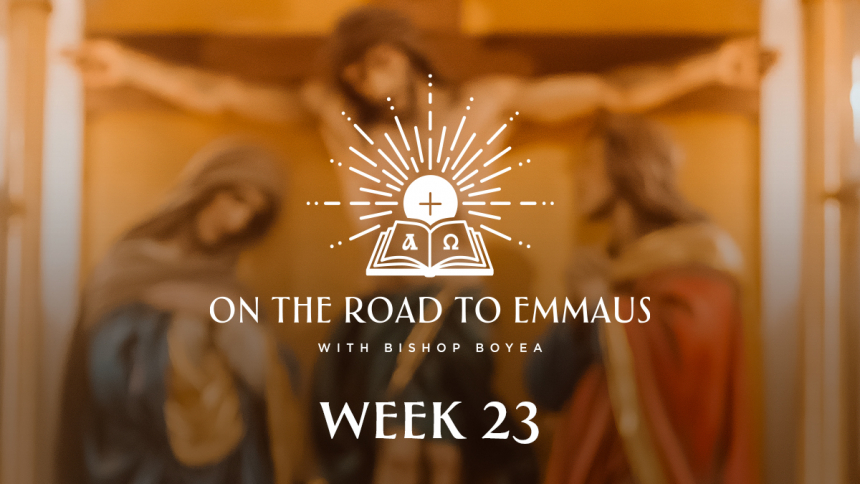
Friday, November 17, 2023
Dear sisters and brothers in Christ,
At the end of the Offertory, the priest says, “Pray, brothers and sisters, that my sacrifice and yours may be acceptable to God, the almighty Father.” We respond: “May the Lord accept the sacrifice at your hands for the praise and glory of his name, for our good and the good of all his holy Church.”
Sacrifice. That is our theme this week as we continue our journey On the Road to Emmaus.
We all know that the Mass is the sacrifice of Christ to the Father and that the priest, standing in the place of Jesus Christ, offers that sacrifice. What is helpful for us here is that this is also the sacrifice of all of us present and indeed of the entire Church. The Second Vatican Council (Lumen Gentium #10) decreed: “The faithful indeed, by virtue of their royal priesthood, participate in the offering of the Eucharist.” It is important then to recognize that it is the entire Church which makes the Eucharist, that same Eucharist which, in turn, makes the Church.
This is a powerful moment for all of us. It was only Jesus’ sacrifice of himself which reconciled us to the Father. It was only his death which opened the way for us to communion with the Trinity. It was only his death which allowed the out-pouring of the Holy Spirit upon each and all of us. So, this is Christ’s act of offering.
Nonetheless, Jesus has allowed us to bring forth the bread and wine and to be one with him in making this offering, this sacrifice to the Father. And this is not just a mere pittance we render to God. Rather, Jesus allows us to be one with him in the perfect sacrifice to the Father. And the Father accepts that and loves us even as he loves his Son.
Perhaps, we have been sitting watching the collection taken up, watching as the gifts are brought forward. But now we stand, and it is our offering. We are not mere watchers; we are active participants as part of the Body of Christ. It is easy for us to say these words in response to the invitation of the priest. Two requirements are made of us, one immediate and the other remote. The immediate response is to be aware of what we say and are ready to do. Lift up our hearts with the very heart of Christ to the Heavenly Father.
The remote requirement is, of course, for us to be those co-offerers with Christ, to make sure that our lives are his life, our words his words, our love his love. The more that we are able to walk into Church each Sunday seeking to be Christ, the better will our co-offering be at this time of Mass as we now prepare for the Eucharistic Prayer.
One of the best ways to do this is to begin each morning by acknowledging the presence of Almighty God and to ask for his divine help in all that lies ahead that day. This type of prayer is called a Morning Offering. It can be as long or as short as you like. The Morning Offering of the 20th century Spanish priest, Saint Josemaria Escriva, consisted of just one word: Serviam! Meaning “I will serve!” It was his early morning repudiation of Lucifer’s non-serviam.
Here’s a slightly longer and more common Morning Offering which you also may wish to employ each day. It was written in 1844 by the French Jesuit, Fr. François-Xavier Gautrelet. Let us pray:
O Jesus, through the Immaculate Heart of Mary,
I offer you my prayers, works, joys, and sufferings of this day
for all the intentions of your Sacred Heart
in union with the Holy Sacrifice of the Mass throughout the world,
for the salvation of souls, the reparation of sins, the reunion of all Christians,
and in particular for the intentions of the Holy Father this month.
Amen.
So that’s the challenge for this week: Pray a Morning Offering each day as a way of uniting our daily lives to the Sacrifice of God the Son to God the Father as re-presented upon our altars during the Holy Mass.
Until next week when we meet again On the Road to Emmaus, may God bless you all.
+ Earl Boyea
Bishop of Lansing
